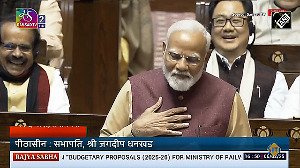"The business and political leaders should realise that measures to bring down emission levels would not cost more than 0.2 per cent of the global GDP, but it could cost up to 3 per cent of world GDP by 2020, and 5 per cent by 2030, if the temperature goes by 2-4 degree Celsius," the head of the UN's Nobel Prize-winning scientific panel on climate change said.
Addressing the annual meeting of World Economic Forum, Pachauri said, threat of climate change has become a threat to world peace. Though there is an unprecedented awareness about the issue, the response of corporate sector and governments was still weak.
The agriculture production may be down by as much as 50 per cent by 2020, due to climate change and by 75-200 millions of tonnes in Africa alone, he said.
Expressing disappointment at global response to the challenge, he said the new EU strategy for slashing greenhouse emissions was "not up to expectations".
The chairman of the Intergovernmental Panel on Climate Change (IPCC) said, the use of renewable energies like biomass, wind and solar power would rise to 20 per cent of all energy forms by over next two decades.
Biofuels would also have to make up 10 per cent of fuels used for transport. Pachauri, whose organisation won last year's Nobel Peace Prize with former US vice president Al Gore, said he was sure that the priorities would change over a period of time.





 © 2025
© 2025